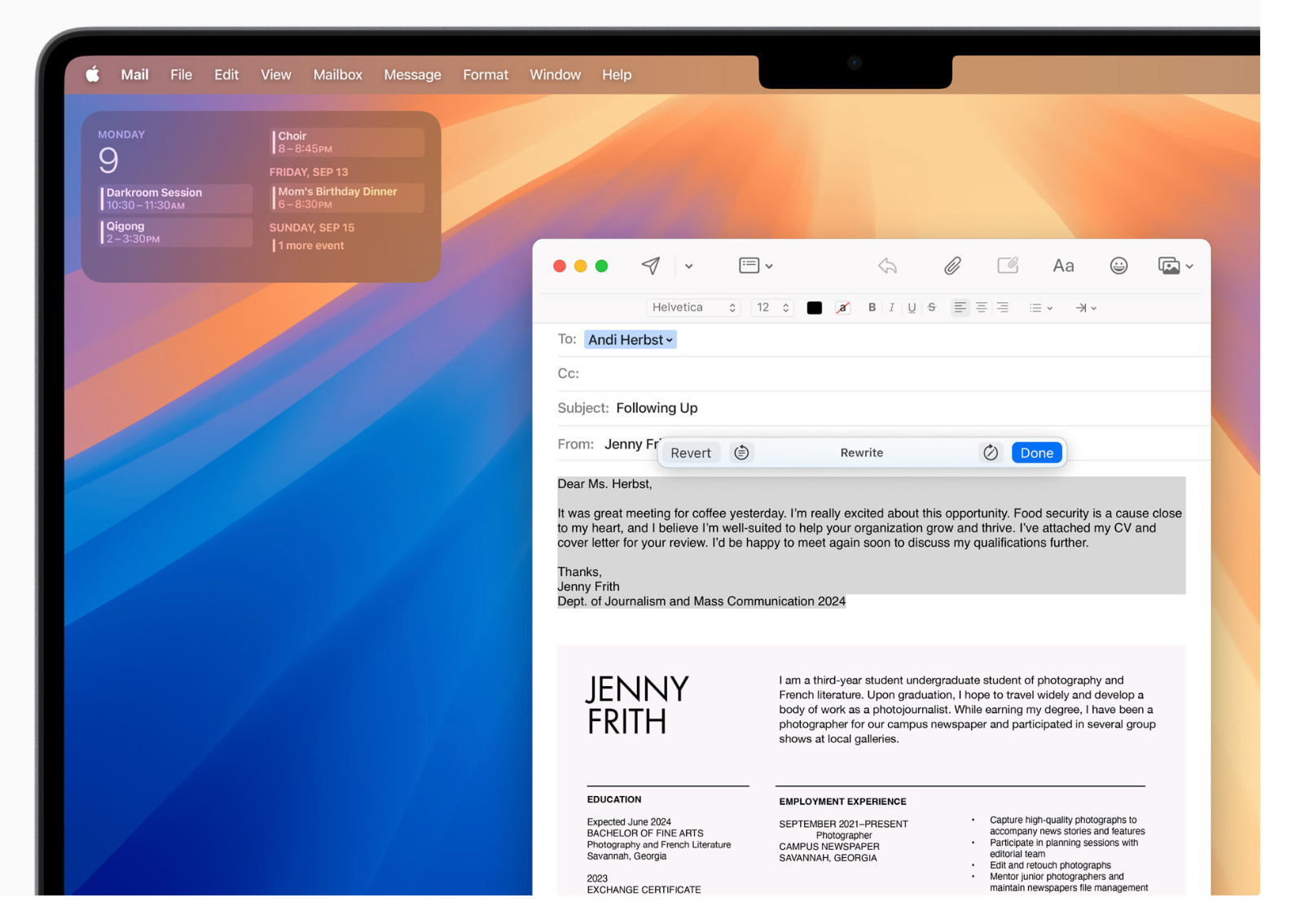The star of the show at Apple's annual launch event last night was not the four iPhone upgrades on display - but Apple Intelligence.
Focused on privacy and security, this suite of AI functions will start rolling out next month on iOS 18.1, iPadOS 18.1, and macOS Sequoia 15.1 - potentially representing an important moment for the enterprise adoption of AI, experts have told The Stack.
Apple's approach includes a relatively small three-billion parameter on-device language model, combined with a larger server-based language model delivered via Private Cloud Compute, a cloud intelligence system designed specifically for private AI processing.
When it first launched Apple Intelligence in beta at WWDC this year, the tech giant claimed that the ability to "flex and scale" computational capacity "sets a new standard for privacy in AI". It insisted that Intelligence does not use personal data or user interactions to train its foundation models (which you can read about here).
After the launch event last night, Apple wrote: "A cornerstone of Apple Intelligence is on-device processing, and many of the models that power it run entirely on device. To run more complex requests that require more processing power, Private Cloud Compute extends the privacy and security of Apple devices into the cloud to unlock even more intelligence."
It claimed Private Cloud Compute "marks a fundamental breakthrough in server-based intelligence", once again telling consumers and businesses that their data is "never stored or shared with Apple" but used only to fulfil their requests.
"Independent experts can inspect the code that runs on Apple silicon servers to verify this privacy promise continuously and are already doing so," it continued.
Apple takes a bite out of enterprise AI
Speaking to The Stack, Nicole Carignan, VP of Strategic AI at British cybersecurity organisation Darktrace described the move towards on-device AI processing and private cloud as a "significant shift" in thinking around AI in enterprise environments.
She said: "Apple is emphasising that these AI assistants will solely reside on the phone for privacy purposes. This move towards on-device processing could address some of the key data privacy concerns that businesses have been grappling with.
But Apple's move also highlights the emerging challenges of dealing with AI in enterprise environments, Carignan pointed out - and shows that monitoring AI use going to become increasingly important.
"As AI becomes more pervasive, we're going to see a growing need for what I call 'AI discovery' services," she said. "Much like IT asset discovery, organisations will need tools to identify where and how AI is being used throughout their entire infrastructure. This is not just about tracking known external AI services, but also about identifying all these new on-device AI agents and systems."
Third-party AI adoption has similarities to the shared security model in the cloud, Carignan added.
"On-device or on-premise AI is a great step forward in data residency and privacy," she advised. "The next step is secure and safe deployment to reduce risks, like deploying strict control boundaries so that agents are not able to autonomously identify other agents within an environment and start communicating."

Guidance for CTOs and CIOs
Former Google Senior Engineer Dev Nag, co-founder of QueryPal said that on-device AI could have important implications for enterprise CTOs and told us that Apple's competitors are already developing their own approaches to on-device AI.
Nag said,:"Microsoft is focusing on creating lightweight AI models like Phi-3 Mini that can run efficiently on phones and PCs without requiring constant cloud connectivity. Google, meanwhile, is leveraging its expertise in mobile operating systems to integrate AI deeply into Android.
"With features like Gemini Nano and new AI capabilities announced for the Pixel 9 series, Google is aiming to make AI a seamless part of the mobile experience. Both companies are exploring ways to balance powerful AI capabilities with on-device processing, addressing privacy concerns while still offering advanced features."
This move offers CTOs and CIOs new opportunities to rethink the way they work, Nag believes.
"This competitive landscape suggests that Apple's on-device approach with Apple Intelligence, while innovative, is part of a broader industry trend towards more localized, efficient AI processing," he said. "Forward-thinking CIOs should view this as an opportunity to reimagine workflows, enhance productivity, and potentially even transform product offerings, all while maintaining compliance with regulations like GDPR and HIPAA."
On device? Come off it...
Other experts have questioned how "on-device" Apple's iPhones really are - and pointed to a wider shift by vendors such as OpenAI towards ensuring privacy and security for customers.
Haroen Vermylen, CTO at Luzmo said: "The main success of Apple's branding was convincing consumers that Apple Intelligence is seismically different from Microsoft Copilot, and it isn't yet.
"Apple Intelligence is not as 'on-device' as the marketing makes it seem. While as much will be done on device as possible, there is no digital alchemy that can compress a trillion-parameter model onto a phone.
"Ultimately, tasks that go beyond summarisation, translation, etc., require a state-of-the-art model, which can only be run on powerful GPUs in external data centres and thus require sending data to vendors like OpenAI.
"The reality is that user security is a concern OpenAI has been working to address for some time and Apple Intelligence will likely leverage these existing solutions.
"For example, the ability to control how much data is sent from a phone, how the owner's profile is anonymised will enable more in-depth interactions but that has to be balanced with user privacy. Apple will likely opt to send the minimal amount of data needed and will have agreements in place restricting storing that data and using it for training."








